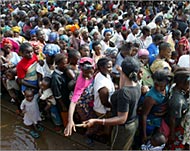Liberian rebel group declares ceasefire
Nigeria will not send peacekeepers to war-torn Liberia until it receives solid guarantees that its bills will be picked up by the international community.

Nigeria has offered to deploy 1500 troops to Liberia where rebels are battling to oust Liberian President Charles Taylor.
The announcement coincides with a unilateral ceasefire declared by rebels Liberians United for Reconciliation and Democracy (LURD).
Rebels seized the country’s second city on Monday and attacked another key town, paving the way for a takeover of Monrovia.
The port city of Buchanan fell to rebels from the Movement for Democracy in Liberia (MODEL), said government military officials and residents.
The fall of Buchanan, 90 km southeast of the capital Monrovia, means there is no seaport left in government hands to ship in vital supplies of fuel and food.
LURD fought fierce battles in Gbarnga, a city on the main highway linking the war-torn country and Ivory Coast.
LURD rebels have so far failed to capture two key bridges leading to the heart of Monrovia in days of fighting.
Rebels are battling to oust Taylor, who has been indicted by a United Nations-backed war crimes tribunal in Sierra Leone. The embattled President, under US pressure, has said he will step down if peacekeepers come to Liberia.
 |
|
People crowd around to receive |
However, West African officials and US military experts, meeting in Ghana’s capital Accra on Monday, failed to set a date for deployment. They also insisted on re-establishing a ceasefire respected by all factions before troops arrived.
Hunger spreads
As the humanitarian situation deteriorates in Monrovia, Liberians’ cries for intervention have grown even louder.
Residents of the capital have risked torrential rains and bullets to search for food. Cats and dogs are being killed to stave off growing hunger as food supplies ran short and prices soared.
People set buckets and bowls under tin roofs to collect rainwater to drink.
Aid workers said there were no reports of starvation but access to food supplies was increasingly difficult.